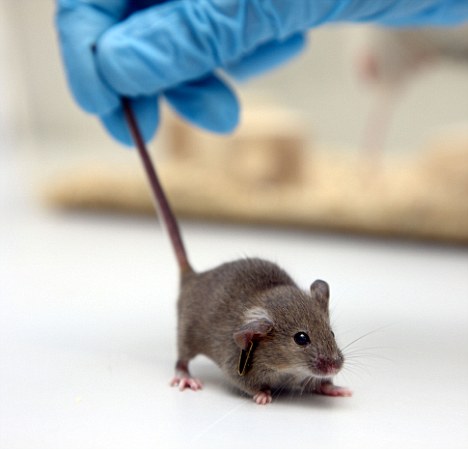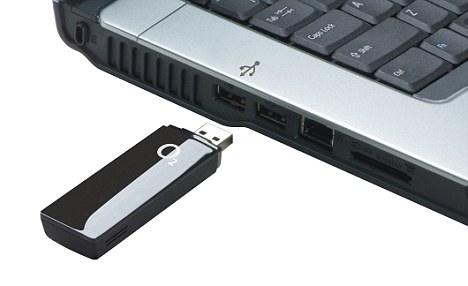The £45m 'organ chips' that could recreate the human body - and might one day replace animal experiments
- Each 'organ' will be size of memory stick
- Entire body could be recreated using ten chips
By Mark Prigg
|
A £45 million research project could
see future generations of drugs tested on "organ chips" that mimic
different parts of the human body.
As well as improving and speeding up
drug development, the move could prevent the suffering and death of many
thousands of laboratory animals.
One goal of the US programme is to simulate a whole human body by linking together 10 different organ chips.
Each "organ" will be about the size of a computer memory stick.

Scientists hope their new 'organ chip' could one day replace the need to experiment on animals
The clear plastic chips contain tiny hollow channels lined with living human cells.
A separate arm of the five-year
project will develop a "microbrain bioreactor", seeded with human
neurons, to mimic the biology of the human brain.
The devices will be used to identify, develop and test novel drugs to treat a host of different diseases.
Currently, much of this work is done by experimenting on animals, usually mice or rats.
But although there are many
biological and genetic similarities between a rodent and a human, there
are crucial differences too.
In some cases, adverse reactions or side effects only become apparent during patient trials - or even when a drug is marketed.
The 'Tissue Chip for Drug Testing'
programme, worth £45 million, is being funded by
three giant US agencies, the National Institutes of Health (NIH), the
Food and Drugs Administration (FDA) and the Defence Advanced Research
Projects Agency (Darpa).
Scientists at the Wyss Institute for
Biologically Inspired Engineering at Harvard University will focus on
the multi-organ chip device.
Colleagues at Vanderbilt University in
Nashville are working on the microbrain bioreactor, which like the
organ chip will contain human cells.
The brain is an especially difficult
target for drug development because it puts up multiple natural barriers
to potentially toxic molecules.

Scientists say the new 'organ chip' will be able to recreate an entire organ in a chip the size of a broadband dongle
Professor John Wilkswo, director of
the Vanderbilt Institute for Integrative Biosystems Research and
Education, said: 'Given the differences in cellular biology in the
brains of rodents and humans, development of a brain model that contains
neurons and all three barriers between blood, brain and cerebral spinal
fluid, using entirely human cells will represent a fundamental advance
in and of itself.'
The US initiative was welcomed by animal welfare campaigners in the UK.
Dr Katy Taylor, scientific adviser for
the British Union for the Abolition of Vivisection, said: 'This is an
exciting example of how modern-day innovation can produce a humane and
more reliable approach to understanding the inner workings of human
disease without the need for animal suffering.
'The USA appears to be
leading the way in funding alternatives, it is now time for the UK to
catch up.'
In the UK, efforts to find
alternatives to animal testing are led by the the National Centre for
the Replacement, Refinement and Reduction of Animals in Research
(NC3Rs).
The independent but largely Government-funded body receives around £5.5 million a year.
-
 Harry and society model 'kissing like teens' in restaurant...
Harry and society model 'kissing like teens' in restaurant...
-
 'I don't want to go to Disney World anymore': Parents' fury...
'I don't want to go to Disney World anymore': Parents' fury...
-
 600,000 move out in decade of 'white flight' from London:...
600,000 move out in decade of 'white flight' from London:...
-
 Woman 'shot' and wounded as she cooks a snack after bullets...
Woman 'shot' and wounded as she cooks a snack after bullets...
-
 'Slap her! Punch her hard!' Horrific moment teenagers force...
'Slap her! Punch her hard!' Horrific moment teenagers force...
-
 Given a snack and then taken out and shot: Horrifying last...
Given a snack and then taken out and shot: Horrifying last...
-
 'We thought the water tasted funny': Los Angeles hotel...
'We thought the water tasted funny': Los Angeles hotel...
-
 Death from a swarm of tiny drones: U.S. Air Force releases...
Death from a swarm of tiny drones: U.S. Air Force releases...
-
 104-year-old forced to lie about her age on Facebook because...
104-year-old forced to lie about her age on Facebook because...
-
 The World War One wasteland: Haunting rare images show...
The World War One wasteland: Haunting rare images show...
-
 'So rough that our pit bull got stolen': As Pine Bluff,...
'So rough that our pit bull got stolen': As Pine Bluff,...
-
 Pictured: Police identify 20-year-old mystery woman shot...
Pictured: Police identify 20-year-old mystery woman shot...


















































































But I like experimenting on animals and insects and DM readers. It's the only thing that gives life meaning.
- killingis , sweet, 26/7/2012 21:22
Report abuse